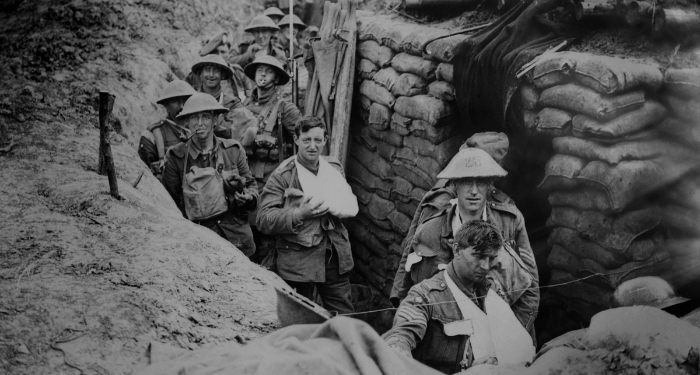
Dear Historical Fiction: Stop Romanticising World War I
My family has a long history with the military and war. When we pause on ANZAC Day (25 April) to reflect on Australian and New Zealand soldiers who died in battle, it has a very personal and poignant meaning for us. ANZAC Day is a hallowed day, not just for my family but for most of Australia and New Zealand as well. It started as a day to commemorate the ANZACs, members of the Australian and New Zealand Army Corps who were sent off to fight in World War I, starting with Gallipoli. It was meant to be ‘The War to End All Wars’. However, the wars didn’t stop, and ANZAC Day has now expanded to include all fallen soldiers within the Australian and New Zealand military.
As the distance of time between WWI and today stretches even further, the importance and even the feel of ANZAC Day seems to be shifting. The same glory-driven propaganda used to encourage enlistment in 1914 has kept going, despite the real-life experiences of those who lived it. For history buffs, it can be a fascinating genre to read. But to be honest, it is rare to find a book that feels real – or at least when compared with the small scraps of tales I have heard from family over the years.
Instead, it becomes too easy to find the books with romantic gestures of heroism and stoic bravery as they face their adversaries on the battlefield. Even from a young age, ANZAC Day is such a big deal in Australia, it becomes entrenched in our collective psyche. Preschool readers share stories of Simpson and his donkey, or vague PG-rated tales of Gallipoli. Rarely do we find stories about the aftermath that are suitable for kids, despite kids often being the ones living with family and friends who continue to suffer. It’s a lot easier to romanticise the bravery of World War I for children than it is to address the injustice of it all.
As ANZAC Day approaches, I found myself drawn once again to books set in this time period. I have watched family members live with PTSD and struggle to coincide their experiences with the hero-worshipping ANZAC spirit that surrounds us. Australia is not alone in this; it is a sentiment shared around the world, wherever people have been touched by war – and unfortunately, that is everywhere. There are, however, fewer people who have been touched directly by WWI. It’s a lot easier to romanticise (and sell) a war kept distant by both time and geography. It was a war fought ‘elsewhere’ in a time ‘long ago’. It was never meant to come home, into our homes. The Great War never ended on the battlefields of Europe. But it did come home with the soldiers and it did influence so much more in our communities. This same attitude still happens today, and now is a good time to learn from the past so we can be better living into the future.
Books That Don’t Romanticise World War I
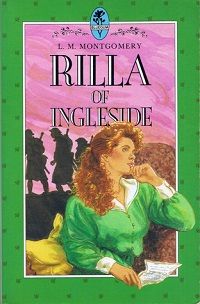
Rilla of Ingleside by L.M. Montgomery
This is the book that first made me stop and think about how we romanticise war, especially World War I. Rilla of Ingleside is the eighth book in Montgomery’s Anne of Green Gables series and turns the focus to Rilla, Anne’s youngest child. Rilla watches as her siblings each leave to help the war effort, either as soldiers or nurses. Rilla’s home perspective filters World War I through the experiences of the families ‘left behind’. It’s a slice of everyday life as they manage the news, the rations, the hopes and fears, and so much more. When I first read it, I was grateful for not reading the graphic details of battle, but I was not prepared for the emotional insight given by Montgomery. To date, I still think this is possibly the best in the series and is my top pick for a World War I book that doesn’t hero-worship.
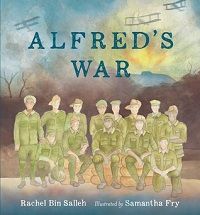
Alfred’s War by Rachel Bin Salleh and Samantha Fry
Alfred’s War is a rare book that doesn’t shy from the trauma of war but still keeps it readable for children. This children’s book tells the fictional story of Alfred, an Indigenous Australian who enlisted and fought in the Australian Army during WWI. It’s a bit strange to know Indigenous Australians could enlist to fight in WWI when Australia’s own racist laws prohibited Indigenous people from receiving military training because only ‘Australians’ of European descent were allowed to. Nevertheless, Alfred is shipped off to Gallipoli until he is injured and returns home. It rises to another level in sharing the story of Aboriginal and Torres Strait Islander Veterans after the war. Their story is part of ANZAC and WWI history, however, they are not shared as prolifically. This is a book we should read when we are 6 years old, not 46.
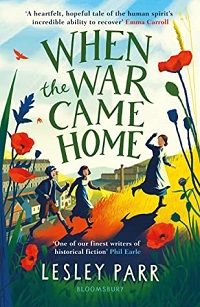
When the War Came Home by Lesley Parr
WWI was not the first war in history, but it was the first global war with soldiers travelling far from their families. When they returned home, they brought the war home with them. Without any connection to the place or purpose, it was hard for families to understand. This historical YA novel captures a lot of this and neatly wraps it in with an interactive mystery. Natty, the 12-year-old protagonist, meets two young soldiers still suffering from the effects of WWI. Huw cannot forget and Johnny cannot remember. The story is moved by Natty’s empathy and care for her friends, but as the reader, I was moved by Parr’s empathy for families and communities recovering afterwards. All of the propaganda pamphlets talk about travel and bravery, but they never talked about the help needed afterwards.
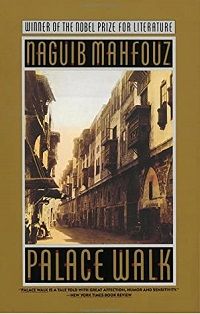
Palace Walk by Naguib Mahfouz, Translated by William M. Hutchins and Olive E. Kenny
Full disclosure: I have only read the English version and would love to hear if there are any elements that may have been lost in translation. After growing up with the ‘glory of the ANZACs’ and their stopover in Egypt, I always wondered what impact this had on the Egyptians who lived there. Mahfouz’s work is a masterpiece in capturing the everyday lives, humanity, and the atmosphere of Cairo during World War I. This time period was more than the war; Egypt had its own social issues leading into the 1919 revolution against British rule. We see this through the lens of Al-Sayyid Ahmad and his family. They are not the average family, and they are not even likable. However, they are part of the climate of the time and their story is an essential part of a bigger picture.

Legacy by Whiti Hereaka
Sometimes the only way to understand someone’s life is to walk around in their shoes. Seventeen-year-old Riki suddenly has the opportunity to do exactly that. Riki starts the story hit by a bus and wakes up 100 years earlier in Egypt circa 1915. He’s living through his great-great-grandfather’s experiences in the Maori Contingent of the ANZACs. This is not your standard historical fiction, mostly because Hereaka doesn’t focus on the battles or campaigns. Instead, she focuses on the people and especially the young Māori who believed in their strength and cultural pride. There are few stories shared about Indigenous people sent to fight in a war for a ‘crown’ which has been fighting them for so long. Word of warning: There is no neat closure, but then again, the same can be said of World War I.

Lovely War by Julie Berry
Lovely War also made it on to fellow Book Rioter Rey’s list of Historical Fiction YA Books About War, and for the same reasons I loved it. It is told through the voice of Aphrodite, Greek Goddess of Love, as she recounts the tale of four mortals to her husband Hephaestus and her lover Ares. She tells the tale of Hazel and James, Aubrey and Colette, during the height of WWI. It is a tale filled with passion and prejudice, yet with the same essential premise Aphrodite always believes in: That war is no match for love. Now, to be fair, I’m not a fan of “The Power of Love” during war times because it can tend to glamorise survival as acts of bravery. However, Lovely War delivers a message of hope; not just for love, but for surviving in a world worth living in after the war.
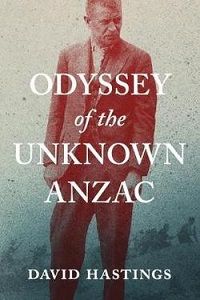
Odyssey of the Unknown ANZAC by David Hastings
Okay, this one is going to kick you right in the feels, and it still resonates with our society 100 years later. It is the true story of George McQuay, a man from Taranaki, who was a soldier in Gallipoli during WWI despite being deemed physically and mentally unfit. Ten years later, an international campaign is launched to determine the identity of an unknown soldier in a Sydney psychiatric hospital. The only clue is the Australian military hat he was wearing when found wandering the streets of London. Reading this book is like looking back in time at how people romanticised the idea of war to encourage predominantly young men to enlist. The same grand gestures of heroism belie the lack of support given to soldiers, both during and post-conflict.
It’s never a good time to read books about war. It’s not like you should go into them looking for feel-good vibes or happy endings. But that doesn’t mean you have to glam it up and romanticise the good ol’ days either. I am not a fan of war or the military in general, but I will still take my moment to commemorate the fallen soldiers, and their stories are worth telling without romance or exaggeration. If that seems a little too real, then perhaps we need to reconsider how we talk about any war at all.














